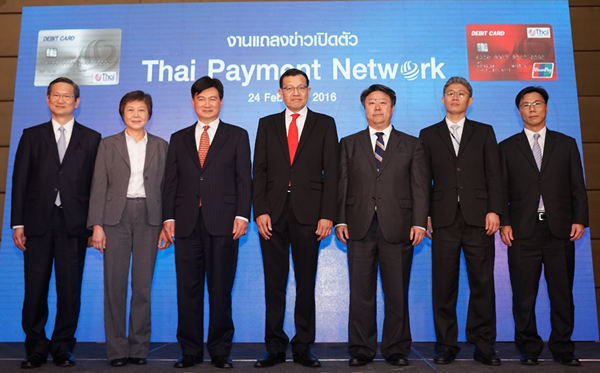The technical standard of UnionPay system development is adopted in Thailand
UnionPay International works with the top four banks in Thailand to build the local bankcard switching system
In 2012, the central bank of Thailand stipulated that all local interbank transactions made with local debit cards must be processed locally in order to reduce cost and promote the development of e-payment. Thereafter, with the support from the central bank of Thailand, UnionPay International established a joint venture called TPN (Thai Payment Network) in September 2014 in cooperation with the four local major commercial banks. TPN is able to provide switching and settlement service for local interbank transactions made with UnionPay debit cards issued in Thailand and to process credit cards in the future. Thailand has also planned to take this opportunity to create an independent debit card brand TPN and issue UnionPay TPN cards based on UnionPay standards. The cards will be conveniently used at the UnionPay network across over 150 countries and regions.
TPN is one of UnionPay's successful attempts in exploring new ways of expansion in overseas markets. In markets with the right conditions, UnionPay exports its technical standard, taking advantage of its technology development capability. It also participates in the construction of payment infrastructure in these markets, integrating its technologies, products, services, and brand influence. UnionPay supports the upgrading of the local payment industry while pushing forward the localization of its business in overseas markets. This is also an achievement of UnionPay's implementation of the ‘One Belt, One Road’ strategy initiative.
The official launch of TPN is of great significance in the following aspects: (i) following UnionPay IC card standard becoming the industry standard of Thailand's banking industry last year, China made new breakthroughs in the export of self-developed financial technical standards, and UnionPay became a model of Chinese enterprises in the "Going Global" moves; (ii) the cooperation between UnionPay and the bank industry in Thailand has shifted from traditional bankcard cooperation to in-depth technical standard cooperation, which has laid a solid foundation for local mainstream institutions to fully enable UnionPay card acceptance and issue UnionPay cards on a large scale; and (iii) TPN will help UnionPay continue to make innovations on replicable business expansion models and accelerate its global business layout.
Chairman Ge Huayong said, "The construction of a local switching network in cooperation with Thailand's major financial institutions is another milestone of Sino-Thailand financial cooperation. We would be ready to introduce many years’ of experience in UnionPay card business to Thailand through TPN development and other feasible ways to support the growth of local e-payment market. We would promote bankcard payment in more fields, such as small and medium sized merchants of Thailand and public utilities and boost local payment services. In the future, we will continue to respond to the implementation of the ‘One Belt, One Road’ strategy and take advantage of UnionPay card business to participate in the payment infrastructure construction and industry upgrading in markets along the ‘Belt and Road’ in a more flexible manner. In this way we will enhance the service quality and support ability of UnionPay network constantly. "
According to Shoke Na Ranong, "The UnionPay card processing and switching center established based on UnionPay technical standards is both safe and advanced. The launch of TPN is win-win progress for all industry parties: merchants reduce risks by receiving less cash, consumers enjoy more convenient and safer bankcard payment service and financial institutions reduce their cost in providing e-payment service. This is conducive to the comprehensive upgrading and continuous development of Thailand's bankcard industry.
Currently, UnionPay cards are accepted in almost all ATMs and about 70% of merchants in Thailand, including large department stores, duty free shops at airports and downtowns, 7-11 convenience stores, chain supermarkets, restaurants and hotels, travel destinations, etc. A total of over 1 million UnionPay cards have been issued in Thailand and this figure keeps increasing. Last year, UnionPay IC card standard was recommended to local banks as an industry standard of the banking industry in Thailand, making Thailand the first country that has adopted UnionPay standard as the local unified IC card standard.
